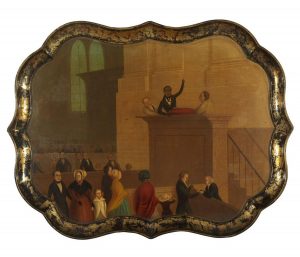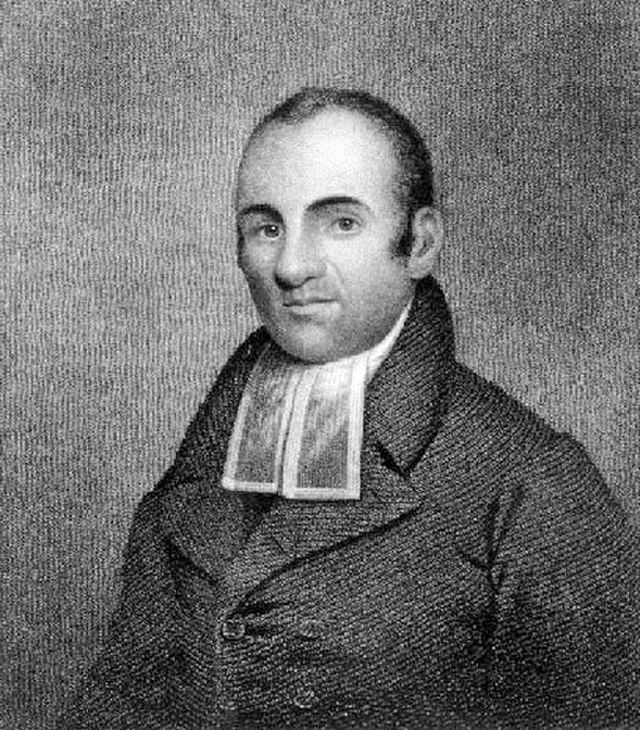By Alex Gerrish
Last Updated: April 17, 2023
Known as “one of colonial New England’s finest minds,” Lemuel Haynes was a father, husband, pastor, and patriot. Haynes is widely considered to be the first Black man in America to be ordained by a Protestant church. Throughout his life, he struggled to combat racial prejudice while his earnestness and religious aptitude brought him international acclaim.
Haynes’ Route to Faith
Haynes was born in West Hartford in 1753 to a Black father and a white mother. Five months after being abandoned by his parents, Lemuel went to live with Deacon David Rose and his family in Granville, Massachusetts.

Tray Depicting Reverend Lemuel Haynes, ca. 1835-1840 – By Unknown Maker, RISD Museum. Used through Public Domain.
While the Rose family raised Haynes, he was also an indentured servant to the family until 1774. Haynes remembered his time there well, even joking that Deacon Rose’s wife loved Haynes more than her own children. In his adolescence, he worked on Rose’s farm during the day and spent evenings at a racially segregated church.
Haynes quickly developed an interest in religion and began writing sermons for himself. One night, while reading to his family, Haynes attracted excitement and attention with one of his own sermons. This positive feedback inspired Haynes to begin a career in religion. At the time his indenture expired (in 1774) the American colonies seemed destined for war with Great Britain so Haynes put his theological dreams on hold and eventually became a minuteman in the Massachusetts militia in 1776.
During this time, Haynes continued writing sermons. Once his military career was over, he conducted services at his local town parish. After the war, Haynes had the opportunity to study at Dartmouth College, but he turned down the offer in favor of studying Latin in New Canaan and Greek in Bloomfield (formerly Wintonbury) with two respected reverends. This opportunity allowed Haynes to further his education while keeping religion in his life.
Haynes’ hard work paid off in November 1780 when he became licensed to preach as a minister of the New Divinity—a religious trend that was gaining popularity in Massachusetts and Connecticut. That same year, he gave his first public sermon in Wintonbury, Connecticut. Shortly after, he accepted a position in a white congregation in Granville, Massachusetts.
Ordination and Preaching in Torrington
In 1785, Haynes became officially ordained as a Congregational minister—the first Black man to attain the title in the United States. Haynes’ first appointment was pastor of the First Congregational Church in Torrington, Connecticut. His appointment was contentious—many Torrington residents initially voiced opposition to the idea of having a Black minister. According to the 19th-century Connecticut historian Samuel Orcutt, one man was so offended by Haynes’ appointment that he disrespectfully wore a hat to Haynes’ service in protest. But Haynes’ “impassioned earnestness” eventually won over the man, who then removed his hat.
Orcutt argued that for many people “curiosity conquered prejudice,” and word of Haynes’ natural preaching skills quickly spread across the state. Although some Torrington residents switched to another church in Goshen, plenty of others came from Goshen to hear Haynes’ sermons. Haynes’ unique position as a Black minister drew people to the church and his charming, distinct, and energetic sermons convinced people to stay.
Haynes’ Move to Vermont and International Fame
While unproven, some historians believe that Haynes left Torrington due to racial prejudice from church members. After two and a half years in Torrington, Haynes received a call to deliver sermons at a church in Rutland, Vermont. Regardless of his reasons for leaving, Haynes answered this call and stayed in Rutland for the next 30 years.
After his move, Haynes began receiving both national and international acclaim. Along with having his sermons and other writings published throughout America and Europe, Haynes became the first Black man to receive an honorary degree from Middlebury College.
In 1818, however, the Rutland Church Council dismissed Haynes. Historians still debate the reasons for this dismissal. Some cite political differences on the basis that Haynes was a lifelong Federalist and his politics conflicted with the council. This is supported by a statement from the Rutland Council which recommended Haynes as “a tried and faithful minister of Jesus Christ” after his dismissal. Others believe the decision was racially motivated.
After his dismissal in Rutland, Haynes answered another call to preach in Manchester, Vermont. During this time, he continued publishing his writings to national acclaim. One novel chronicled his experience counseling two men convicted of murder, both of whom the court later acquitted.
Lemuel Haynes died at 80 years old on September 28, 1833, and was buried in South Granville, New York, where he had taken his final minister position. He left behind his wife, Elizabeth Babbitt (a white schoolteacher), ten children (two predeceased Haynes), and a storied career. Although he frequently encountered racial prejudice, his talent and passion for religion allowed him to earn the respect of his peers. Today, Haynes is remembered as one of the most captivating and dynamic figures of his time.
Alex Gerrish is the Programs Manager at the Noah Webster House and holds a B.A. in American Studies from Western New England University. He would like to extend a special thanks to the Torrington Historical Society and the Wintonbury Historical Society for their assistance with the research for this article.









